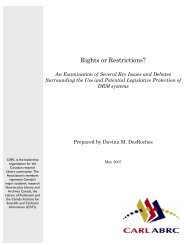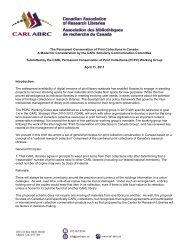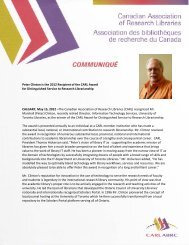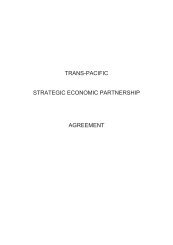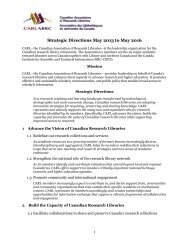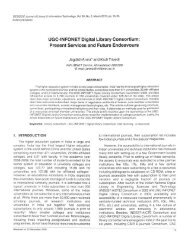PDF - CARL - ABRC
PDF - CARL - ABRC
PDF - CARL - ABRC
Create successful ePaper yourself
Turn your PDF publications into a flip-book with our unique Google optimized e-Paper software.
<strong>CARL</strong> Brief for Open Access Engagement Strategy<br />
May 2010<br />
Document 11<br />
The Rationale for Open Access<br />
Open Access (OA) is a means of disseminating scholarly and scientific literature over the internet free of<br />
charge to researchers and to anyone else who might benefit from accessing the results of publicly<br />
funded research. Research libraries have lent their support to the open access movement as a way of<br />
extending their mandates to preserve and provide access to the world’s knowledge, but have also seen<br />
in it a viable solution to the problem of escalating journal subscription prices. From 1989 onwards the<br />
average scientific journal price had steadily risen by 315 % by 2003. Prices have increased at a slower<br />
rate in recent years, however, they continue to rise by about 9 % yearly 1 .<br />
Libraries have been able to defray the costs of providing access to the corpus of scholarly journal<br />
literature by transitioning more and more to an electronic access and archiving environment by way of<br />
regional consortial journal content licensing arrangements or by purchasing much of the same electronic<br />
content for perpetual institutional ownership. However, even the most financially endowed university<br />
libraries cannot subscribe to all 24, 000 scholarly, scientific, technical, and medical journals that are<br />
currently published. Faced with this problem, libraries must periodically cancel journal subscriptions in<br />
order to allocate their limited acquisitions budgets to the journal content faculty and students at their<br />
host institutions use most heavily. This is something which places students and researchers at a<br />
disadvantage. Research is increasingly a multi‐disciplinary endeavor and it is not always easy to for<br />
libraries to determine what content they can dispense with in the collections they manage. This is<br />
problem for large institutions, but especially for libraries that support medium and smaller‐sized higher<br />
learning institutions. The current global economic crisis that began in the fall of 2008 has added<br />
impetus for libraries and Academia to consider bringing OA practices into the way they conduct their<br />
business – especially in light of budgetary cutbacks or freezes.<br />
But OA is not only about devising sustainable publishing and access models to research journal<br />
literature. Researchers and librarians also see it as a means to repair a scholarly publishing system that,<br />
although it has worked in the world of print‐based dissemination, drastically limits the possibilities<br />
offered by the emerging networked research environment and the internet. If researchers cannot<br />
always access parts of the current research literature in their fields they are missing information that is<br />
potentially vital to their research, and the result is that the progress of scientific discovery is stalled.<br />
Open Access levels the field for researchers everywhere, in terms of accessibility, giving scientific<br />
literature the broadest possible dissemination so researchers can find it, interpret it, and build on it to<br />
help solve problems and challenges society faces.<br />
Recommendation:<br />
The Canadian Association of Research Libraries (<strong>CARL</strong>) recommends that all stakeholders in Higher<br />
Education in Canada seriously explore how they can support Open Access by way of new publishing<br />
initiatives, OA policies and institutional mandates.<br />
1 Open Access Scholarly Information Sourcebook (OASIS) , Why librarians should be concerned with Open Access<br />
http://www.openoasis.org/index.php?option=com_content&view=article&id=254&Itemid=256 , and Association<br />
of Research Libraries, Monograph and Serial Expenditures in ARL Libraries, 1986 – 2003<br />
http://www.arl.org/bm~doc/monser04.pdf<br />
1




